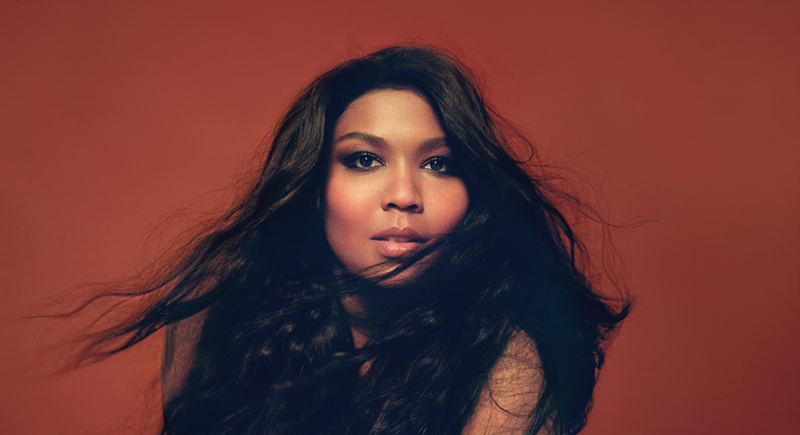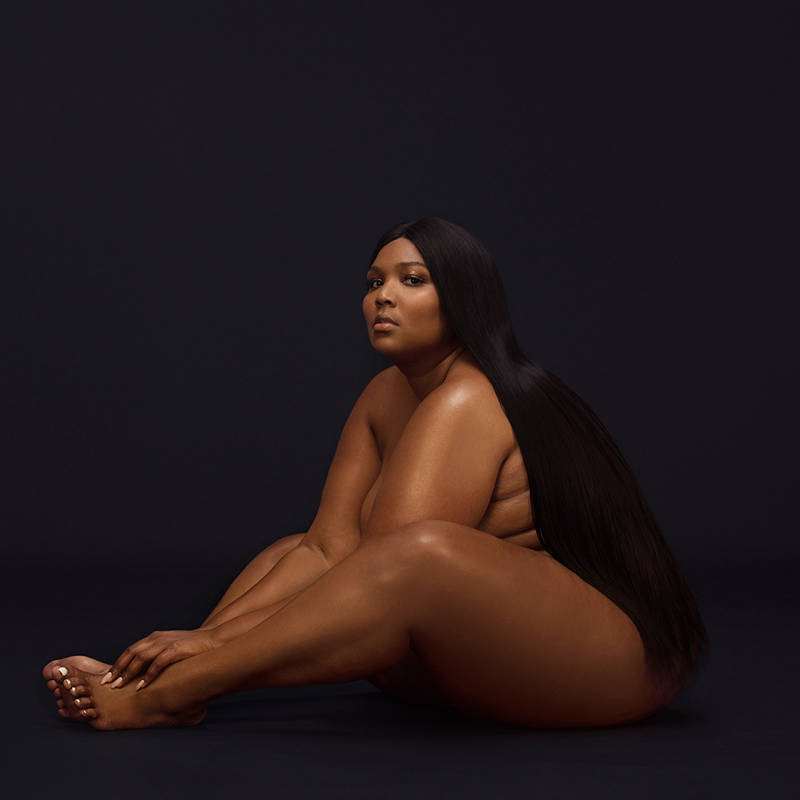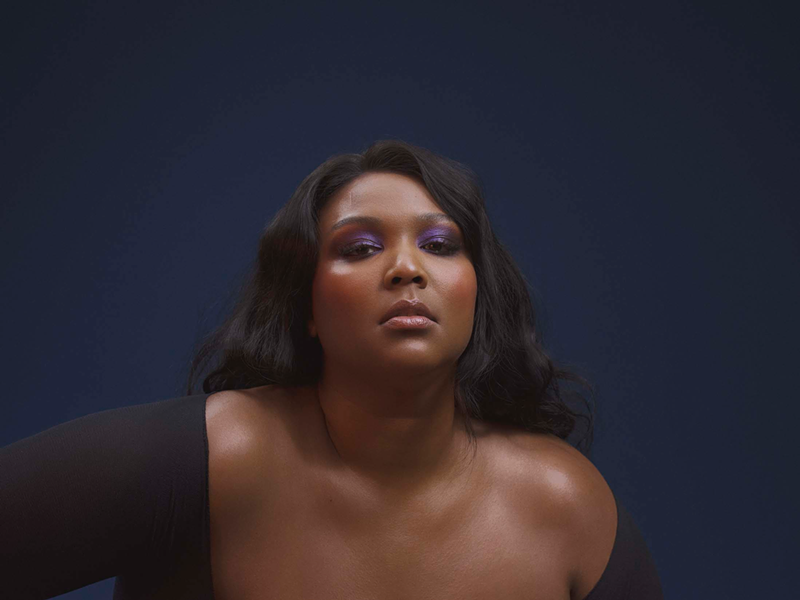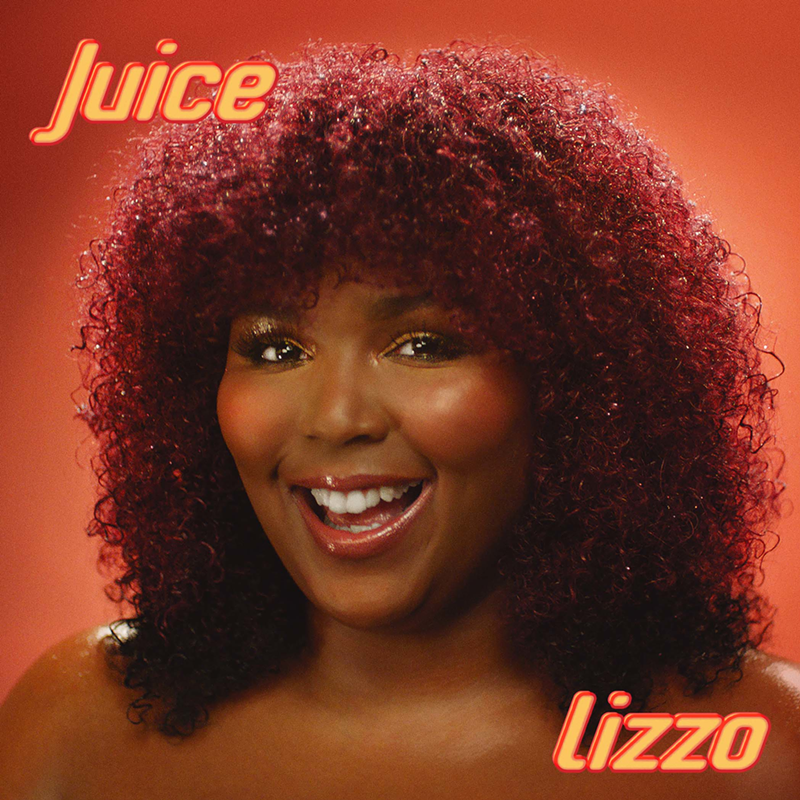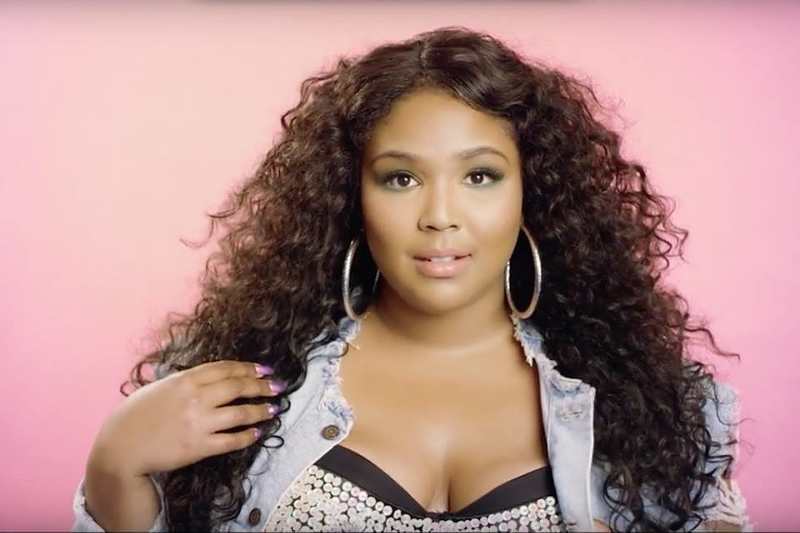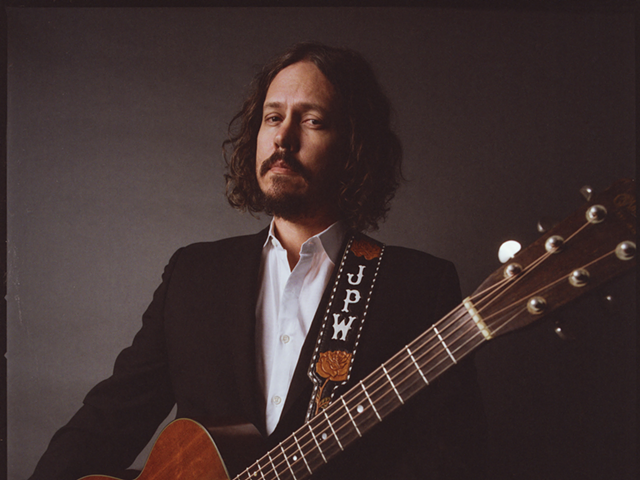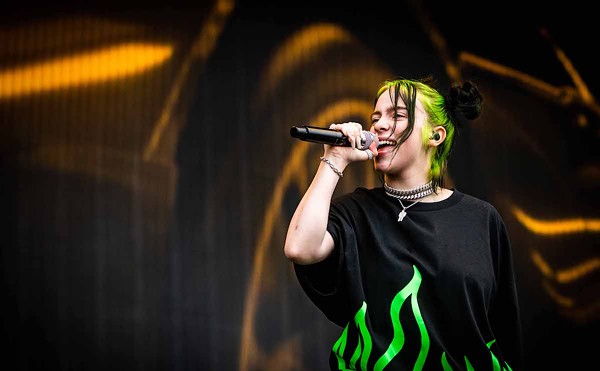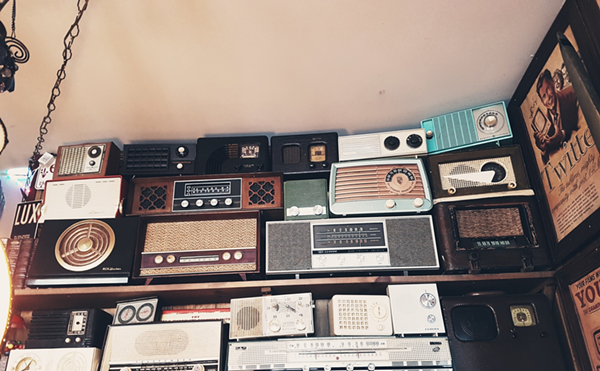Lizzo spent her birthday eating ass.
Not just any ass, but her own ass — just one glowing example of how the Detroit-born twerking rapper, flutist and Pop star is taking self-love and empowerment to new heights.
"I had three cakes shaped like my ass," the 31-year-old says of her birthday, which she celebrated on the road. "One had a flute on it, one of them was my album cover and one of them was this giant ass with a flower in the asshole. I've had so much cake the last three days."
To put it lightly, you could say that Lizzo is having a moment — one in which she has her ass-shaped cakes and eats them, too, while also managing to land her full-length major-label debut, Cuz I Love You, at No. 6 on the Billboard charts (its deluxe-edition single “Truth Hurts” just jumped into Billboard’s Hot 100 top 10) and her big, beautiful, dimpled derriere twerking across magazines, billboards, Twitter feeds and the exhaustive album rollout talk-show/touring/summer festival circuit.
Even Lizzo’s "bitch-ass" flute has amassed more than 136,000 followers on Instagram.
"She almost got canceled and I couldn't save her. She's a bitch," Lizzo says of "Sasha Flute." "She needs to start a charity or a foundation because this bitch needs to humble herself."
Lizzo’s recent rise to the top of the pop culture mountain can also be seen in her Greater Cincinnati concert bookings. When it was announced that she would play the mid-size Covington venue Madison Theater in June, tickets for the show sold out quickly — very quickly. When she had to cancel that concert to prepare for performances at both the MTV Movie & TV Awards and the BET Awards, a new date was booked at a much larger venue: the 17,550-capacity riverfront U.S. Bank Arena.
Born Melissa Viviane Jefferson in 1988, Lizzo knows how to strike an endearing balance between confidence and humility, appearing in genuine awe of her string of sold-out shows while also treating her entire record as a love letter to herself, declaring that her body is not merely a snack, but the "whole damn meal" as she does on the lead single, "Juice," or more directly on "Soulmate." Get you a Lizzo who can do both.
Lizzo's other recent accomplishments include but are not limited to: Gaining fans in Reese Witherspoon, Janelle Monáe, Minnesota Rep. Ilhan Omar and Michigan's Gov. Gretchen Whitmer, who was reportedly singing along to her favorite song, "Good As Hell," in the back of her tour bus in a New York Times profile (sample lyric: "Boss up and change your life/You can have it all, no sacrifice"); challenging fictional flutist and Anchorman Ron Burgundy to a flute-off (she won); being cast opposite Cardi B and Jennifer Lopez in the stripper heist drama Hustlers; penning a heavily meme'd lyric that also inspired hordes of TikTok users to share their genealogy results ("I just took a DNA test/Turns out I'm 100 percent that bitch."); earning a standing ovation for her performances at the aforementioned BET and MTV Movie & TV awards; receiving rapturous praise from the U.K. press for her set at the Glastonbury festival; and becoming the first plus-size woman of color to appear in a Playboy feature.
While it could be prematurely argued that this is Lizzo's year (even she admits that 2019 has been the craziest of her life), she's had plenty of time to primp and prepare for what she describes as "entering a new world of mainstream success."
But don't call her the next Beyoncé, as Mother Jones did in a recent headline.
"Beyoncé is already Beyoncé, why the fuck would I want to be that?" Lizzo says. "I don't have enough money to change my name."
After moving from Houston to Minneapolis in 2011, Lizzo stealthily made a name for herself as founder of indie Hip Hop groups the Chalice, Grrrl Prty, the Clerb and Absynthe before releasing her 2013 solo debut, Lizzobangers. In 2014, she collaborated with Minneapolis royalty Prince on his record Plectrumelectrum. That same year Time named her one of its 14 artists to watch.
"Well, the Lizzo train been going for a while. In my mind, since 2013 and after, like, I've been on that hoe slowly going faster, faster, faster, faster," she says. "When 'Juice' hit a million so quickly and kept going after that, I was like, 'Whoa, what's happening?' It's like suddenly all eyes are turned in this direction."
The eyes are indeed turned in Lizzo's direction, so much so that she found herself making her first "celebrity" apology based on a tweet that set the Twittersphere — and music journalists everywhere — ablaze.
"PEOPLE WHO 'REVIEW' ALBUMS AND DON'T MAKE MUSIC THEMSELVES SHOULD BE UNEMPLOYED," Lizzo tweeted in April in response to Pitchfork's lukewarm review of Cuz I Love You.
In her review, Pitchfork contributing editor Rawiya Kameir admits that Lizzo's skill and charisma are undeniable forces on and off the record (though says her press cycle feels like an "extremely long yaaaaaaas") but cites "overwrought production" and clumsy rapping among the reasons she scored Cuz I Love You a 6.5 (out of 10). Kameir also deflates Lizzo's dream of becoming the "ARETHA FRANKLIN FOR THE 2018 GENERATION" as she did on Twitter last year, suggesting instead that Lizzo is more likely to become this generation's Natasha Bedingfield than the Queen of Soul, and adding that "Juice" or "Soulmate" could garner the same commercial success as Bedingfield's "Unwritten" and could easily score a "rom-com or yogurt commercial."
Lizzo admits her tweet was misguided and says it wasn't necessarily in response to an unfavorable review — it was about feeling as though Kameir had "white-washed" her experience by comparing her to Bedingfield, something she finds more offensive coming from one black woman to another.
"My tweet was definitely misinterpreted, and now that I'm realizing that that's a possibility, that my tweets can get misinterpreted like that, I really need to watch what I say," she says. "I never said we don't need music journalists. I just felt like, man, I wished these asshole music writers that liked to do things for shock factor, I wish they could be in a studio for one day and write a song. I wish they knew what it felt like to tear down somebody's baby and that's all I meant."
Following the backlash, Lizzo tweeted an invitation for music writers to join her in the studio and tweeted again shortly after vowing to take her temper off the internet. In addition to attracting even more attention for the record — although, admittedly not the kind of attention she wanted — Lizzo's temper also ignited a dialogue about the relationship between music journalists and artists. The same week as her "quote-unquote celebrity apology thing," Ariana Grande came under fire after defending her legion of fans who attacked a music writer for calling out Grande's hypocrisy when she tweeted that music critics were "so lost," "unfulfilled" and "purposeless."
"I was just like, ‘Bitch, you're just trying to be the one person gave me a bad review in a sea of good reviews,’ and I really, really, really regret..." Lizzo trails off. "I was drunk, too. And I was at Coachella. I was just like hot. Like, I have no excuse for saying something like that because I appreciate the perspective that music journalists and critics have, and I appreciate all the love and positivity. I just don't like that one bitch. And if I ever saw her in the street, I would have words for her."
Just days before her tweetstorm, Lizzo had won the hearts of many a music writer (outlets like Slate had already hailed the record a well-deserved "victory lap" and Rolling Stone's Rob Sheffield referred to Lizzo as a "hero" and Cuz I Love You a "legend-making" album) and snagged glowing headlines for her perseverance during her debut sets at the Coachella music festival, both of which were plagued with technical issues. Lizzo and her team of dancers, including a handful of performers she had never worked with before the event, were forced to think, sing and dance on their toes when the sound abruptly cut out as early as two songs in, and again during "Worship," forcing the singer to endure glitches as she live-sampled Aretha Franklin's "Respect."
"If they ain't gonna get the music right, I'm gonna get the music right," Lizzo said during the performance. "That's why I got my music major."
Throughout her 11-song set, Lizzo chugged Patrón straight from the bottle and navigated countless instances of tracks dropping out, sometimes multiple times in a single song. During the second weekend's performance, the sound dropped during her set's closer, which she finished a capella, egomaniac Sasha Flute in hand and with a crowd drunk on Lizzo juice.
Looking back at how Coachella did her wrong, Lizzo isn't looking for an apology. In fact, she's grateful for how everything went down and refers to the experience as a "team-building moment."
"I mean, I've always been a performer that can work on my toes. I've always dealt with technical issues, but I've never dealt with anything like that," she says. "Like, the Rock & Roll girl in me wants to go off, but then I heard one of the girls onstage, she said, ‘Keep going.’ I heard her say that and I was like, ‘I gotta keep going.’ So I just powered through it. I think that it changed something in me. We ran a lot of tests to see what happened. It was a lot of different factors on my end as well. At the end of the day, I don't think I need an apology. I just want to headline."
Coachella was but a testament to the power of Lizzo's voice — something that, surprisingly, gets overshadowed by her ability to twerk and play the flute at the same time, and the fact that she's often classified as a rapper. But Lizzo's confidence has been a lifelong battle, especially in terms of using her voice as an instrument.
"I didn't think I was a good singer (growing up) mostly because my mom and my sister were better singers than me," she says. "I was like, ‘Well, I'm just going to be the smart one. Like, I'll be the nerd, the bookish one.’ ”
In Detroit, Lizzo grew up deeply connected to her family's Pentecostal church, which she says is still active and exposed her to her earliest vocal influences, most of which were rooted in Gospel music, citing the likes of singers Karen Clark Sheard, BeBe and CeCe Winans, and Aretha Franklin. Her family relocated to Houston when she was 8 or 9 years old, which is where she learned about Hip Hop and freestyling and where she would sow the seedlings of her show-womanship as a piccolo player in marching band through college.
While Cuz I Love You is on pace to hold high court in the pantheon of body positivity culture (surpassed only by her own Coconut Oil EP from 2016 and maybe Christina Aguilera's self-love banger, "Beautiful") — Lizzo's stunning foray into the mainstream is rooted in trauma and pain and her irrepressible ability to laugh through all of it.
The singer says she suffered a domino-like effect following the death of her father in 2010 (with whom she regularly communicates through a medium), which resulted in a brief period where Lizzo suffered homelessness and depression and was under the belief that her music career would not pan out. For that reason, the danceable sunshine-y vibrancy on Cuz I Love You (an album that mentions some form of crying in nearly every song), is a testament to the way Lizzo sees life — through Lizzo-tinted glasses.
"I think I naturally laugh when I'm shocked," she says. "I don't know what it is, whether it's a defense mechanism or if it's just some padding. Humor is really therapeutic for me. So I think that's the reason why I'm able to turn things into silver linings. Even when I'm in the studio and I'm singing about crying or when I'm actually crying in the studio like when I write 'Truth Hurts,' you know?"
"I think that's just the way that I am. It's just… I was literally just designed to do this. I'm not forcing it."
Lizzo performs at Kiss 107.1’s Loud & Proud 2019 show at U.S. Bank Arena on July 26. Tickets are $25-$60. Tickets/more info: usbankarena.com.
This story originally appeared in CityBeat’s sister paper, Detroit Metro Times.
UPDATE: Promoters of Lizzo's Cincinnati concert say there are only a handful of tickets left for Friday's US Bank Arena show.
⚠️LOW TICKET WARNING⚠️
— Nederlander (@Nederlander) July 25, 2019
Don't be left out! There are only a handful of tickets left for @KISS107's Loud & Proud 2019 with @lizzo! Grab them while you can! https://t.co/qwz93ObagD

